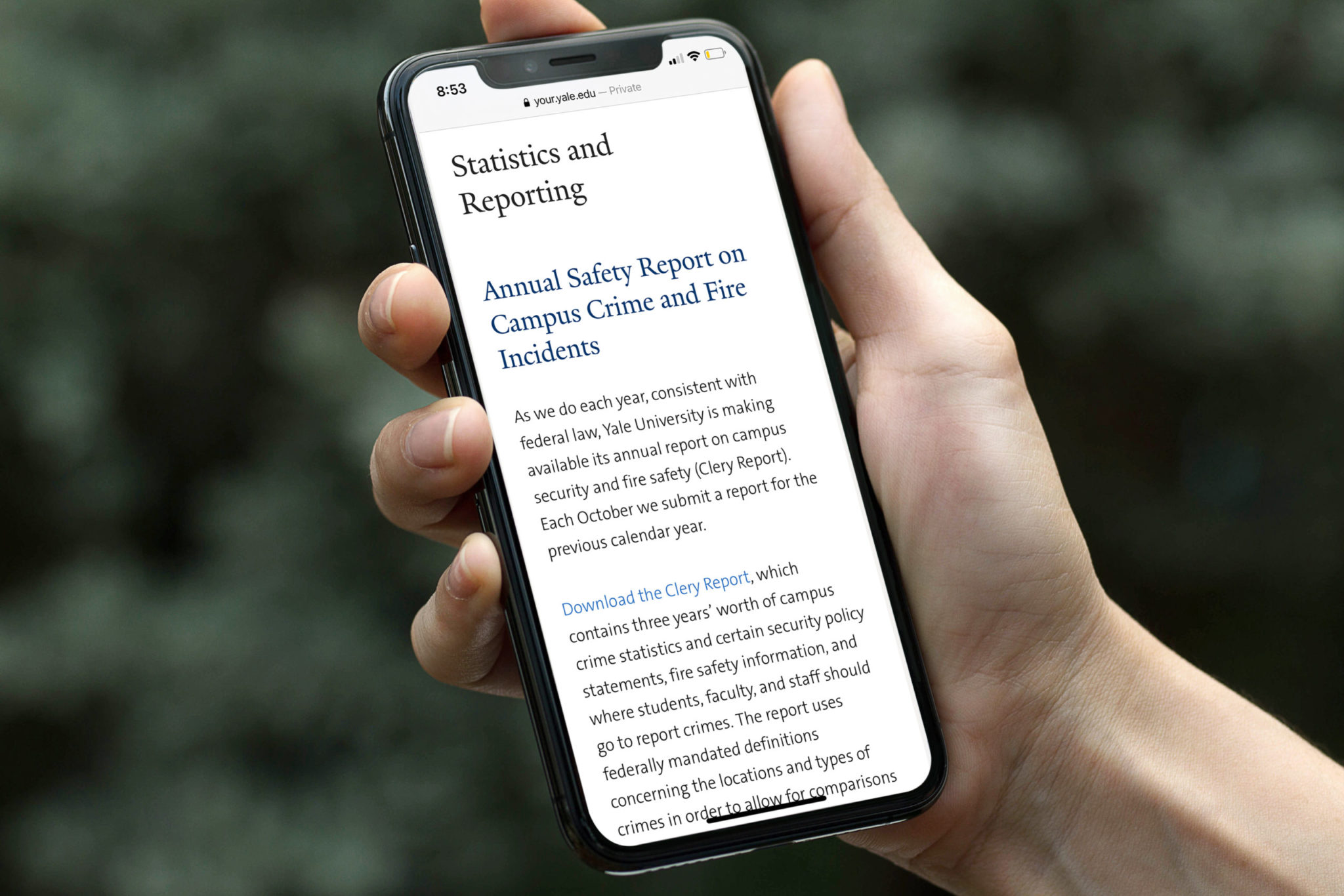University’s annual campus security and fire safety report shows crime fell during unprecedented pandemic year
Most instances of reported crime decreased from 2019 to 2020, with the exception of domestic and dating violence.

Vaibhav Sharma, Photo Editor
Yale’s annual campus security and fire safety report, released Thursday, revealed that reported instances of on-campus crime and sexual assault fell between 2019 and 2020.
The 2020 report was announced in a schoolwide email from Jack Callahan, Yale’s senior vice president for operations. It shows that crime went down across the board between the years 2019 and 2020; for example, the report found that instances of on-campus burglary dropped from 36 in 2019 to 20 in 2020, while sexual assault incidents experienced a smaller decrease from 32 in 2019 to 29 in 2020. On-campus drug arrests dropped from 10 to three and stalking instances went down from 20 to six across the two years. Domestic and dating violence, however, rose slightly in 2020 — the report listed ten on-campus instances, compared to eight in 2020. Neither year saw any on-campus murders.
“The report highlights Yale Public Safety’s commitment to maintaining a safe living, learning, and working environment in partnership with our shared community,” Yale Police Department Chief Ronnell Higgins wrote in an email to the News.
The report, which is usually released on or before Oct. 1, is mandated by the Jeanne Clery Disclosure of Campus Security Policy and Campus Crime Statistics Act, or “Clery Act.” It is compiled by the Yale Police Department using data provided by a number of university officers including the Office of the General Counsel, the Fire Marshal’s Office, the Title IX Office, the University-Wide Committee on Sexual Misconduct, the Office of Emergency Management and Yale College.
The report is compiled from crime statistics collected by the Yale Police Department as well as fire statistics from the Yale Fire Marshal’s Office. The Yale Police Department collects such crime statistics from two primary sources: police agencies and school officials “with knowledge of formal and informal complaints” from Campus Security Authorities. Reports from CSAs are solicited annually by the Senior Vice President For Operations, and the report is compiled accordingly.
In a year of drastic change brought about by the pandemic, the report also allowed the collection of university offices to share how they coped with such challenges and to detail the resources available through their offices. It also briefly outlined the University’s future plans for addressing COVID-19, sexual assault and campus crime.
The report also reviewed last year’s COVID-19 response, highlighting how the University requires “all students, faculty, staff, and postdoctoral or postgraduate trainees” to be fully vaccinated or have approved exemptions to the mandate.
In an email to the News, Dean of Student Affairs Melanie Boyd in part attributed the University’s successful COVID-19 response to its vaccination strategy.
“Yale was fortunate to make it through last year without major outbreaks.” Boyd wrote. “A lot of credit goes to the layered approach — a lot [of] prevention through education and public health guidelines, as well as routine testing that enabled swift isolation and contact tracing when positive cases did emerge.”
In the University-wide email, Callahan encouraged students to review the report and inform themselves of the campus resources available to them.
In particular, the report’s Title IX section provides a comprehensive list of resources available to students who experience sex discrimination. Sex discrimination, according to the report, can include “sexual harassment, sexual assault, and other forms of sexual misconduct.”
Should students be faced with such an issue or need someone to consult with, they can refer to the report’s directory of Title IX Coordinators or review descriptions of various programs to file complaints, receive medical care or seek emotional support. These include the University-Wide Committee on Sexual Misconduct (UWC), the Sexual Harassment and Assault Response and Education Center (SHARE) and the Communication and Consent Educators (CCE) Program.
“I hope that people know we exist and that they at least know who the CCEs are in their college,” Josephine Holubkov ’24, a CCE, said of the program.
Moving forward, Holubkov added that the CCEs’ Survivor Support Project Team is brainstorming how it can best stage interventions for people who have experienced sexual violence “this year and beyond.” Additionally, the group plans to host bystander workshops for both first-years and sophomores, as well as more specific workshops for upperclassmen.
Students can access the full report on the Yale Public Safety website.







